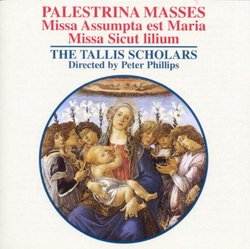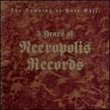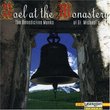| All Artists: Gregorian Chant, Giovanni Pierluigi da Palestrina, Peter Phillips, Tallis Scholars Title: Palestrina Masses: Missa Assumpta est Maria / Missa Sicut lilium Members Wishing: 0 Total Copies: 0 Label: Gimell UK Release Date: 6/12/2001 Album Type: Import Genre: Classical Styles: Opera & Classical Vocal, Historical Periods, Early Music Number of Discs: 1 SwapaCD Credits: 1 UPCs: 755138102026, 028945492025 |
Search - Gregorian Chant, Giovanni Pierluigi da Palestrina, Peter Phillips :: Palestrina Masses: Missa Assumpta est Maria / Missa Sicut lilium
 | Gregorian Chant, Giovanni Pierluigi da Palestrina, Peter Phillips Palestrina Masses: Missa Assumpta est Maria / Missa Sicut lilium Genre: Classical Recommended in Laura Berquist Syllabus Grade 7Artist: VariousFormat: 1 discs, Audio CDPublisher: Harmonia MundiISBN: 7551381020 |
Larger Image |
CD DetailsSynopsis
Product Description Recommended in Laura Berquist Syllabus Grade 7Artist: VariousFormat: 1 discs, Audio CDPublisher: Harmonia MundiISBN: 7551381020 Similar CDsSimilarly Requested CDs
|
CD ReviewsAward-winning Tallis Scholars! FrKurt Messick | Bloomington, IN USA | 07/08/2004 (5 out of 5 stars) "--Plainchant-- Plainchant is basically another word for chant of Gregorian or other styles, being monophonic and in free rhythm. The particular piece here, Assumpta est Maria in caelum, is a series of four verses. The first track on this CD presents the plainchant version without embellishment; perhaps as one would have originally heard it in a medieval monastery. --Palestrina-- Giovanni Pierluigi de Palestrina is sometimes called the greatest composer of the Roman Catholic church. Born in 1525 near Rome, he spent the better part of his career in service to the church as a choir member, choir master, conductor, composer and school master. He was sought after by many churches, and sometimes his popularity and skill got him into trouble both with his clerical patrons and with fellow musicians. He was offered prestigious positions in Rome and Vienna which were ultimately withdrawn because Palestrina's salary and conditions requirements were too high. He had some influence on the Council of Trent's musical decisions for reform of the Catholic worship practices, and was involved intimately with revising the Gradual and produced a harmonised version of the Latin Hymnal in 1589. He died in 1594.--Motets and Masses-- The first motet and mass presented here is Missa Assumpta est Maria in caelum. Masses for the Blessed Virgin Mary have always been popular, and this is one of the most-performed pieces by Palestrina, and has been from its composition, although it was not published in Palestrina's lifetime. It is, according to Phillips, a `positive, outward-going, major-key' piece that is one of the most significant compositions of the period. By contrast, Missa Sicut lilium inter spinas is relatively unknown, little published and little performed. Phillips had very little guide to follow in performing this piece, so this work by the Tallis Scholars is a true original. The motet for Sicut lilium was published in Palestrina's First Book of Motets (ironically, Assumpta est Maria in caelum was not, but is better known); Missa Sicut lilium inter spinas was published in a late book of Palestrina, but is believed to be an early work. It is believed that great composer Orlandus Lassus sometimes performed this mass and motet.--Liner Notes-- Being internationally acclaimed, the Tallis Scholars' CDs typically present their commentary and texts in English, French, German and Italian (together with any Latin texts); that is true of this disc. The cover art also typically represents visual arts contemporary with the compositions - here it is `Madonna and Child with eight Angels', a piece by Botticelli, who was a rough contemporary of Palestrina. One drawback is that there is little information on the Tallis Scholars or Peter Phillips in the booklet. --The Tallis Scholars- The Tallis Scholars, a favourite group of mine since the first time I heard them decades ago, are a group dedicated to the performance and preservation of the best of this type of music. A choral group of exceptional ability, I have been privileged to see them many times in public, and at almost every performance, their singing seems almost like a spiritual epiphany for me, one that defies explanation in words. Directed by Peter Phillips, the group consists of a small number of male and female singers who have trained themselves well to their task. Their recordings are of a consistent quality that deserve more than five stars; this particular disc of pieces by Palestrina and the plainchant deserves a place of honour in the collection of anyone who loves choral music, liturgical music or Gregorian chant, classical music generally, or religious music. It is astonishing music, one of many Palestrina pieces the Tallis Scholars have recorded. It was recorded in 1989." In the Palestrina discography's top percentile R. J. Stove | Gardenvale, Victoria Australia | 05/17/2004 (5 out of 5 stars) "Not only does this superbly engineered issue belong in the Palestrina discography's top percentile, it shows how greatly the composer's earlier idiom differed from that of his later - and better-known - pieces. SICUT LILIUM is dark, obviously elaborate, and written as a rather selfconscious homage to the Flemish polyphonic tradition. By the time Palestrina produced his renowned ASSUMPTA EST MARIA Mass setting, all need to match himself against Flanders's contrapuntal trellis-work had gone; the music, unfailingly radiant, sounds divinely effortless. The same can be said of Peter Philips's choristers: whose superb tonal blend and equally impressive across-the-barline phrasing, far from being studio artefacts, are just as splendid in their live performances. Absurd though it would be to purchase only one Palestrina recording, be assured: this repertoire has never been done better on CD than it is here." A little piece of heaven here on earth R. Sinatra | New Jersey | 09/21/2005 (5 out of 5 stars) "This particular Mass setting in honor of the Assumption of the Blessed Virgin Mary shows not only Palestrina's genius but also why he is considered by some to be the savior of sacred polyphonic music. This stirring production by the Tallis Scholars not only delights the ear, but also the soul with voices that border on the etheral. A must have for fans of traditional liturgical music!"
|










